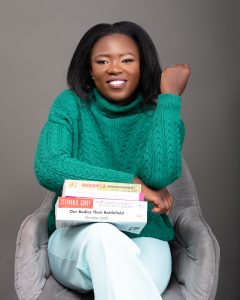“Ni msichana, aah, wewe bado hujazaa,” the plump 30-something-year-old lady glances down at the baby in my arms. Her name, she says, is Ruth. We’ve just come back from the hospital because the baby has jaundice, a week after she lands in this crazy, strange, loud world.
A thought: Kenya’s first President, Jomo Kenyatta, sought to eradicate three things: poverty, disease, and ignorance. 60 years later, the trio has given birth to great-grandchildren. One of the manifestations is telling me giving birth to a girl doesn’t count.
I smile. Poverty of the mind is funny.
How do I feel? Somewhere between mild okayness (sometimes), numbness (most times), and soreness (nearly every time). My body is still shocked, but it is trying to come together; it is trying to nurture itself back to wholeness. I’m yet to understand what just happened to me. On one hand, it is a beautiful miracle. What has just happened changes the course of the universe—a child has been born, and I assure you, it is no ordinary thing. On the other hand, it seems like one of womanhood’s greatest punishments. In the how it crushes you. I will never be the same again.
How did it happen?
***
We check in and book a room at 8 pm. 4cm dilated. The doctor comes in at 1 am asking a series of questions which I keep pardoning because I can’t catch his Cuban accent. How has humanity achieved remarkable strides in technology and medical breakthroughs, yet a more effective method for measuring uterine dilation has not been developed?
“Relax,” he says. I try.
Motherhood – A Creative Nonfiction by Louise Venter, South Africa
My husband is lying on the couch, and I, the patient (wait, are you still a patient if you’re there to give birth?) on the customizable hospital bed. We tell stories until we fall asleep. The doctor comes back in at 4 am for another dilation check nightmare, with a nurse in tow. 50% dilated but save for the mild contractions, I have not experienced any labour pains. I’m a bit disappointed because I didn’t want to miss any step in the birthing process. I wanted to properly answer the question: how long was your labour?
“I’m going to rupture the membranes to speed up the labour,” the doctor explains. Tells me to bend over. Water everywhere! Clean water. For some reason, I didn’t expect amniotic fluid to be so clean—even though we refer to it as water on this side of the continent.
Quickly, he tears off the glove on his left hand, dips his hand in the pocket, and makes what sounds like an SOS call. The right hand is still inside me.
“Listen, we have to rush you to the theatre.”
Theatre? But we did everything ‘right’, I want to explain myself but there’s no time. All indications were that I was fit for a Vaginal birth.
“Cord Prolapse,” he says.
Like most about-to-give-birth women, I ransacked the internet for birth stories and what could go wrong but not once did I come across this cord prolapse. It’s like studying for an exam and that one thing you didn’t read about is the first question in the exam paper.
I’m lifted and placed on a stretcher. My husband is made to sign a just-in-case-she-dies-you-cannot-sue-the-hospital form that he can’t even read through. All this while I’m bent over with his hand inside me, holding up the baby so she doesn’t lie on the cord and cut off her oxygen supply. I try to tell myself that all this is okay, a man’s entire hand inside my vagina. That there’s no shame in giving birth. Statistically, a woman dies every two minutes due to pregnancy or childbirth. That’s what you should be worrying about, a voice points a finger at me. That you could be a statistic. Dying while giving birth—one of the universe’s saddest realities.
Motherhood Through my Kaleidoscope – A Creative Nonfiction by Makia Lucy, Kenya
But, I still end up as a statistic, according to my mother-in-law. Jo’pala, she calls ‘us’. People of the knife. My husband says it should be jo’scalpel. People of the scalpel. And we argue whether or not a scalpel is really a knife.
Jo’pala. Such a funny-sounding word. But when I think about it now, there’s no difference. A scalpel is really a knife—at least to the extent that it will be used to chop up the layers of your abdomen, and a baby extracted from it—like a cow, I think to myself—to ensure the sustainability of the universe.
An incision is made through the skin, then the subcutaneous tissue, then the fascia, then the muscles, then the peritoneum, and finally, the doctors arrive at the baby’s house—the uterus. I can feel the first two cuts, and then the anaesthesia kicks in. It is an emergency, so everything had to be done fast-fast. In that moment, something is cut out, something I’d never recover, something I have no name for. But someone will say that giving birth through CS is unnatural-lazy-not-wanting-to-feel-pain. Not being ‘woman enough’.
I was appalled at how it seems pregnancy and birth are handled as ‘normal part-of-life experiences. The entire thing, in my opinion, is horrendous. It is anything but normal. Nothing I had ever read, nothing I had ever seen, experienced, or in any way interacted with. Nothing at all prepared me for the impact the processes of pregnancy and delivery and post-partum created on my entire being: Physically, it felt like I had been hit by a trailer and a tonne of bricks placed on top of me. Emotionally, I felt bankrupt. Spiritually, it felt like I was protesting against God. Mentally, I often asked myself if I was still alive.
Motherhood Through Different Lens – A Creative Nonfiction by Kimumwe Douglas, Uganda
The pain I experienced post-surgery is unmatched. The strong painkillers would wear out so fast and I’d keep ringing the bell for the nurse to bring in more. And more. They had to give me more than the recommended dosage. I couldn’t even cry. I had to channel every ounce of energy into survival; I didn’t have any waste of tears. After a day, I could move my body. But my brain froze into a log for what felt like ages.
The sacrifice is so worth it. You’ll forget the pain, they say. And I truly want to believe it.
***
I wonder what Ruth would say if she knew I bore another girl. Two more XX chromosomes!
Wewe bado hujazaa.
She said it like I had failed some life exam. But I wasn’t offended. Strangely, some people survive on a combination of stupidity, ignorance, and audacity.
***
If I had a chance for a next time, if I didn’t feel completely defeated, if birthing and mothering didn’t feel like a completely horrendous life-shattering accident, if pregnancy didn’t feel like an attack by carnivorous aliens, perhaps I would have remembered to give birth next time. If I could go back in time, I could give birth properly, this time with the ‘right’ combination of chromosomes. To be a ‘successful’ mother. Just maybe.
 Verah Omwocha is an award-winning Kenyan writer, Book Editor and Reviewer. Verah has co-authored four books for the Kenyan curriculum for primary and secondary levels, and published four children’s books: Maria and the Tomatoes, Kally the Pet and Wendo Tours Nairobi County, and Naisula Tours Marsabit County. She had also contributed to a Young Adult Short Story anthology, The Cry of the Crow and other Stories. Her most recent publication is her memoir, Diary of the Miaha.
Verah Omwocha is an award-winning Kenyan writer, Book Editor and Reviewer. Verah has co-authored four books for the Kenyan curriculum for primary and secondary levels, and published four children’s books: Maria and the Tomatoes, Kally the Pet and Wendo Tours Nairobi County, and Naisula Tours Marsabit County. She had also contributed to a Young Adult Short Story anthology, The Cry of the Crow and other Stories. Her most recent publication is her memoir, Diary of the Miaha.
Visit https://linktr.ee/verahomwocha to read some of her sample writings.
Verah won the 2017/8 Tito Livio Award for Historical Fiction for her short story, ‘The Crescent Moon’
Verah holds a Master’s Degree in Literature from Kenyatta University and a Bachelor of Arts degree in Education (Language and Literature) from the University of Nairobi.







